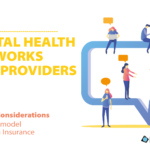When I think about what I have learned working in the insurance industry, I find that it has been the experience that has helped me to solve problems and improve things. Day-to-day business experiences and thinking and reflecting on those experiences. One of the keys to this knowledge of business processes is to get to the details and go into them in depth. “The devil is in the details”, and the failure or delay of major technology projects is in missing them. The details are very important because knowledge of sometimes minuscule aspects is what allows us to discover essential elements.
It has been this need to delve into the business and its details to have an overall vision, which has helped me to move towards technology in a natural way. From the digitalization of specific processes and operations to the digital transformation of an organization, it is necessary to consolidate projects with that KNOWLEDGE in capital letters, business and technical, which is not always easy to concentrate in one person and can even be deficient in a team.
Details are very important because sometimes it is the knowledge of minuscule aspects that allows us to discover the most important elements

Understanding the business allows you to know what needs to be done and having the technical knowledge, how to carry it out. Agile methodologies seem to convey a certain message of improvisation on technology projects, but this is not the case. Agile is a versatile method and although the execution of a systems project in a world of rapidly changing realities requires flexibility and adaptation, prior knowledge and reflection are essential. What’s more, in Agile they are especially useful because only a solid base on what the project will entail will allow room for adaptation in unforeseen aspects. That is why it is more necessary than ever to examine and study projects before tackling them. It seems obvious, but it is not. Sometimes there is little reflection in digitalization, technological adaptation, and digital transformation projects, but one must be careful about assuming what is commonly accepted and not analyzing it. Thinking is important and doing it in the right way is not easy.
Be careful in assuming what is commonly accepted and not analyzing it
It is from the value we place on business and technical knowledge, where we want to present a series of posts that we will start publishing soon, focused on the digitalization of health insurance, a very important niche of Delonia’s activity. These are the the Digital Considerations on Health Insurance which will be developed by José Luis Vilariño, insurance consultant and architect of this idea aimed at transferring pills of very valuable knowledge consolidated over years of experience. From contracting, through the provision of services and up to the settlement with suppliers. An authentic manual divided into monthly installments.

José Luis Vilariño has a degree in Computer Engineering and has digitalized the insurance business when this term did not yet exist. He has created two health companies, Caser Salud where he set up the first online insurance banking operation in Spain, and Antares Salud, one of the first companies to create value for customers through widespread digital and online services. He can be described as an eclectic person, as defined by the enlightened thinker Diderot: “An eclectic is a person who overrides prejudices, traditions, antiquities, universal consensus, authority and all that subjugates mass opinion, who dares to think for himself by returning to the most obvious general principles, examining them, discussing them and accepting nothing that is not evident from experience and reason”.
José Luis Vilariño, an insurance consultant, is the architect of this idea aimed at passing on valuable knowledge gained from years of experience
The Digital Considerations on Health Insurance will address many topics, some already planned and others yet to be planned, and is so titled because it will form a continuous and valuable narrative for all those of you who want to delve deeper into the private health insurance business and its transition to a complex but inevitable digitalization. The publication will be regular and continuous, and we will present it to you in the middle of each month. As the Indian proverb says in the voice of Dominique Lapierre: “What is not given is lost”, so we are delighted with the knowledge that will be provided to those of us who are passionate about a sector that needs to continue growing and adapting to the times.




